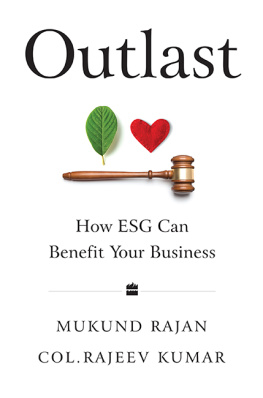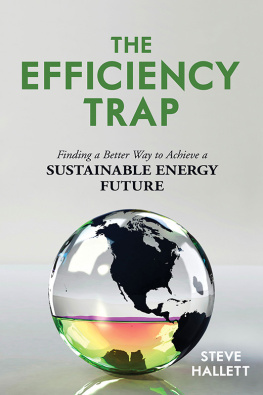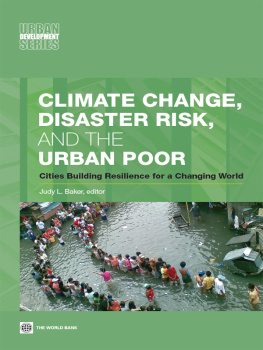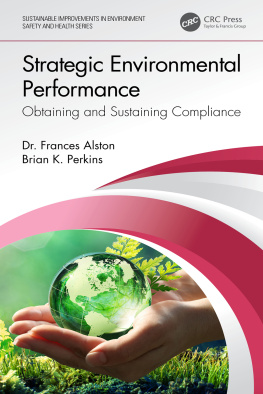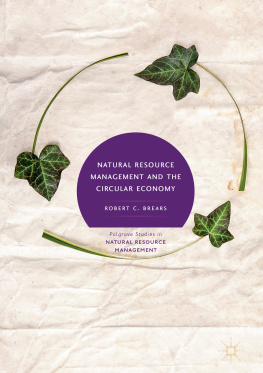Table of Contents


This book, completed during an unprecedented pandemic, is dedicated to our loving families, and to the indomitable human spirit that can build a world where people, planet and prosperity are in perfect balance.
Contents
ESGEnvironment, Social and Governance
AAPAam Aadmi Party
ADAGAnil Dhirubhai Ambani Group
AIFsAlternate Investment Funds
AIGCCAsia Investor Group on Climate Change
ARAIAutomotive Research Association of India
ASSOCHAMAssociated Chambers of Commerce (of India)
B2BBusiness to Business
BJPBharatiya Janata Party
BRRBusiness Responsibility Report
BRSRBusiness Responsibility and Sustainability Report
BSEBombay Stock Exchange
CAACitizenship Amendment Act
CAGComptroller and Auditor General (of India)
CAGRCompound Annual Growth Rate
CARECredit Analysis & Research Limited
CalPERSCalifornia Public Employees Retirement System
CalSTRSCalifornia State Teachers Retirement System
CBDR-RCCommon but Differentiated Responsibilities and Respective Capabilities
CBICentral Bureau of Investigation
CDPCarbon Disclosure Project
CEOChief Executive Officer
CIIConfederation of Indian Industry
CILCoal India Limited
CMSCentre for Media Studies
CNGCompressed Natural Gas
COAICellular Operators Association of India
EESLEnergy Efficiency Services Limited
EIAEnvironmental Impact Assessment
EPA(United States) Environmental Protection Agency
EPR Extended Producer Responsibility
ESOPEmployee Stock Option Plans
ETCEnergy Transitions Commission
FCAFalse Claims Act
FCLT Focusing Capital on the Long Term
FICCIFederation of Indian Chambers of Commerce and Industry
GCFGreen Climate Fund
GISR Global Initiative for Sustainability Ratings
GPIFGlobal Pension Investment Fund
GRIGlobal Reporting Initiative
GSIAGlobal Sustainable Investment Alliance
HULHindustan Unilever Limited
IAMAI Internet & Mobile Association of India
IBBIInsolvency and Bankruptcy Board of India
IBCInsolvency and Bankruptcy Code
ICRA(previously) Investment Information and Credit Rating Agency of India Limited
IFINIL&FS Financial Services Ltd
IIRCInternational Integrated Reporting Council
IL&FSInfrastructure Leasing and Financial Services
IiASInstitutional Investor Advisory Services
ILOInternational Labour Organization
IPCCIntergovernmental Panel on Climate Change
IPS Indian Police Service
IRIntegrated Reporting
IRDAIInsurance Regulatory and Development Authority of India
IRENAInternational Renewable Energy Agency
IRSIndian Readership Survey
ISA International Solar Alliance
ISOInternational Standards Organization
LICLife Insurance Corporation of India
NCAPNational Clean Air Programme
NCLT National Company Law Tribunal
NDCNationally Determined Contributions
NFRANational Financial Reporting Authority
NGONon-Governmental Organization
NGRBCNational Guidelines on Responsible Business Conduct
NHRCNational Human Rights Commission
NPANon-Performing Asset
NSENational Stock Exchange
NTPCNational Thermal Power Corporation
OECDOrganization for Economic Cooperation and Development
ORFObserver Research Foundation
OSOWOGOne Sun One World One Grid
PATPerform-Achieve-Trade
PFRDAPension Fund Regulatory and Development Authority
PCGTPublic Concern for Governance Trust
PPPPublic-Private Partnership
R&DResearch and Development
RBIReserve Bank of India
RTIRight to Information
SASBSustainability Accounting Standards Board
SDGSustainable Development Goal
SEBISecurities and Exchange Board of India
SECSecurities and Exchange Commission
SIAMSociety of Indian Automobile Manufacturers
TAAPTata Affirmative Action Programme
TBLTriple Bottom Line
TCFDTask Force on Climate-Related Financial Disclosures
TERIThe Energy and Resources Institute
TISSTata Institute of Social Sciences
TRAITelecom Regulatory Authority of India
UNUnited Nations Organization
UNCHEUnited Nations Conference on the Human Environment
UNEPUnited Nations Environment Programme
UNFCCCUnited Nations Framework Convention on Climate Change
UNPRIUnited Nations Principles for Responsible Investment
USLPUnilever Sustainable Living Plan
WEFWorld Economic Forum
WHOWorld Health Organization
WMOWorld Meteorological Organization
WTOWorld Trade Organization
VWVolkswagen
T his book was completed in the shadow of the worldwide spread of COVID-19. From one infected patient in the city of Wuhan, China, in December 2019, the virus spread to over 1 million patients in over 180 countries within three months. By the time this manuscript was ready for publication, the virus had infected over 235 million people, and killed over 4.8 million people.
The rapid spread of COVID-19 illustrates how interconnected the world has become, with travellers unwittingly transmitting the virus from country to country. It has also revealed the fragile existence of numerous economic players, from microenterprises to national governments.
With strict lockdowns imposed across many countries, millions of small retailers, eateries, beauty salons, garages and travel agents unable to earn incomes have shut shop. At the other end of the spectrum, many countriesfrom small island nations that depend heavily on international tourism to Middle Eastern ones that rely on the sale of oil, the price of which crashed amidst the worldwide economic slumpare struggling to balance their books. Global economic growth has been negative in 2020, contracting by around 5 per cent as compared to the previous year.
At such a time of great economic stress, with collapsing customer demand, supply chain disruption, unemployment, economic recession and increased uncertainty, the values espoused by many in the corporate sector have come into question. The limited financial reserves of several companies and their inability to sustain overheads beyond a few weeks of the COVID-19 crisis have revealed their excessive short-term focus and weak long-term planning. Their decisions to cut jobs and dismiss casual labour, withdraw job offers and reduce the pay of their staffers during the crisis have raised questions about their concern for critical stakeholders such as their employees and workers.
This is the case in India as well. The grim sight of millions of migrant labourers walking hundreds of miles back to their homes, families in tow, without prospects and often without even being paid for their recent labour, has shaken the conscience of fellow citizens.
Economic growth for the 202021 fiscal has been negative in India, and tens of millions of Indians are likely to find themselves out of work for a fair length of time. With the largest poor population in the world, India can ill afford this.
Sadly, the COVID-19 catastrophe is a dress rehearsal for other major challenges that lie ahead, especially the climate change crisis. Indias long coastline, with its several hundred million residents, is physically threatened by the rise in sea levels that global warming will cause. The country already suffers some of the hottest summers across the globe, and rising temperatures caused by global warming will make outdoor work impossible during certain parts of the season.

